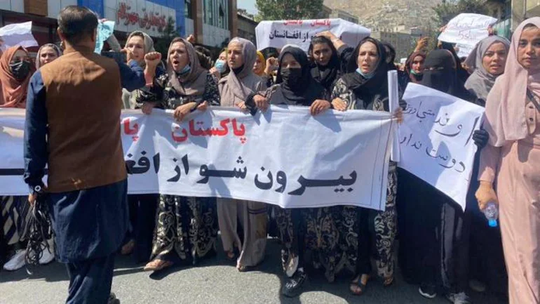On September 7, the Taliban prevented media personnel from covering an anti-Pakistan demonstration in Kabul, seizing camera equipment and detaining several journalists and photographers. Protesters were rallying against Pakistan’s alleged interference with Afghanistan’s internal affairs, particularly the Inter-Services Intelligence (ISI), following the Pakistan military’s aid in suppressing the Afghan resistance force.
Tolo News photographer, Waheed Ahmadi, and Ariana News correspondent, Sami Jahesh, were among those arrested over coverage of the anti-Pakistan protest. The BBC’s team was also prevented from filming the demonstration.
Following his apprehension, Ahmadi was handcuffed and had his camera seized by Taliban militants before being detained at the Taliban military headquarters in Kabul. Another journalist arrested during the demonstration stated that Taliban militants ordered Ahmadi to rub his nose on the ground and apologize.
On September 8, journalistsTaqi Daryabi and Nematullah Naqdi from Etilaatroz daily were arrested by Taliban actors while reporting on the women’s protest in the Kart-e-Char region of Western Kabul. While detained, Daryabi and Naqdi were subject to repeated attacks on their person using sticks and cable wire.
Following the arrest of Darbi and Naqdi, Etilaatroz’s editor Kadhim Karimi and fellow journalists Lutfali Sultani and Aber Shaygan visited a local police station to lobby for the release of the detained reporters. In response, they were also arrested. After hours of detention, all five journalists were reportedly released.
In another incident of detention, a local producer of EuroNews was detained, attacked and released after three hours in the Taliban’s custody on September 8.
Afghan women took to the streets of Kabul and north east Afghanistan to protest the lack of inclusion of women in the interim Taliban government. During the protest, Afghan women and girls also raised their voice against the Taliban’s violations of women’s rights. The Taliban deemed the protest illegal, using force to disperse the protestors, with some sustaining injury and detainment.
According to Hujatullah Mujadidi, vice president of the AIJA, a total of 14 arrested journalists were released on September 7. Mujadidi serves as a focal point for local media groups to report on attacks against the media and journalists.
The AIJA said: “The AIJA condemn the violent treatment of journalists during the recent demonstrations and call on the Taliban officials to allow journalists to freely cover the news.”
The IFJ said: “The continuing arrests, threats and violence towards journalists and media workers in the field fundamentally contravenes the Taliban’s renewed promises of a free, independent and private media. The IFJ strongly condemns these attacks to press freedom and calls for all journalists to be able to work independently without fear of retribution.”
The IFJ has established a special Afghanistan Solidarity Fund within the IFJ Safety Fund to channel further support and urge those who can donate. All funds raised will go directly to providing support to Afghan colleagues.

